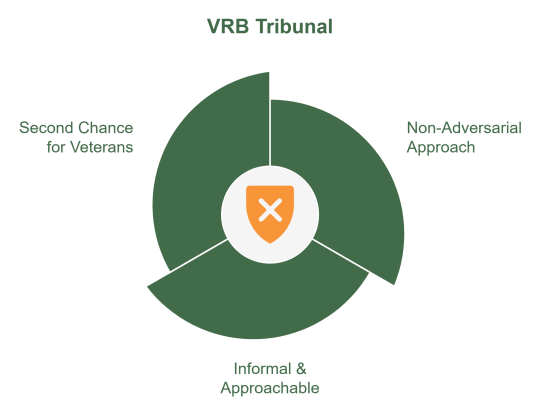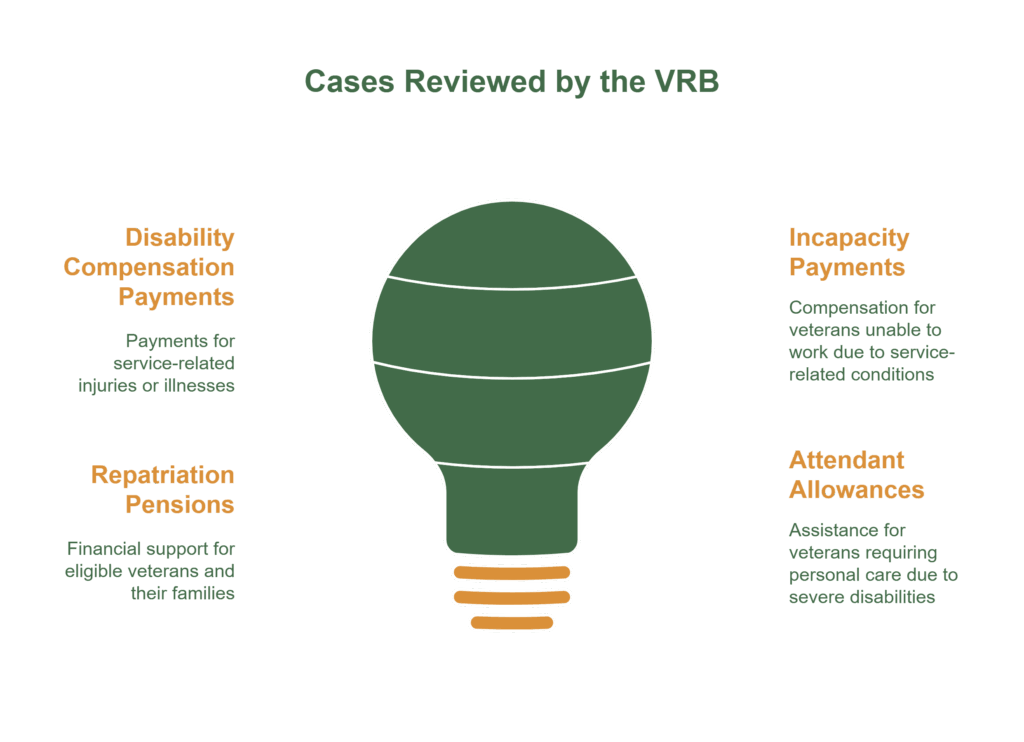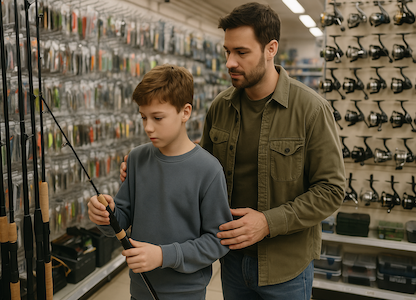For veterans, current service members and their families, accessing entitlements and support can sometimes be a complex process. When decisions made by the Department of Veterans’ Affairs (DVA) don’t reflect their needs or circumstances, the Veterans’ Review Board (VRB) offers a way to appeal.
Key takeaways
- The VRB offers a fair, independent appeals process for veterans, current ADF members and their families who disagree with a DVA decision.
- You don’t need a lawyer to access the VRB — its informal, non-adversarial approach is designed to reduce stress and make the process easier.
- Cases are reviewed on their merits, not just on procedure, meaning new evidence and personal circumstances are considered.
- From April 2025, the VRB will also review DRCA claims, helping streamline access to entitlements across the entire veteran support system.
Understanding the Veterans’ Review Board
What is the VRB?
The VRB is an independent statutory tribunal that operates within the Australian Government’s Veterans’ Affairs portfolio. Its main role is to review decisions made by DVA about entitlements and compensation claims.
The VRB acts as an accessible review body for veterans, current and former members of the Australian Defence Force (ADF), and their families. It gives those affected by DVA decisions a second chance to have their case reconsidered.
The VRB operates under several key pieces of legislation that govern veterans’ entitlements:
- Veterans’ Entitlements Act 1986 (VEA) – Covers pensions, allowances, and benefits for eligible veterans and their dependents.
- Military Rehabilitation and Compensation Act 2004 (MRCA) – Provides rehabilitation, compensation, and support for service-related injuries or illnesses.
- Safety, Rehabilitation and Compensation (Defence-related Claims) Act 1988 (DRCA) – From April 2025, the VRB will also review decisions under this Act, further streamlining and harmonising veterans’ entitlements processes.
By providing an independent review process, the VRB plays a vital role in maintaining fairness and accountability within Australia’s veteran support system.
Purpose and Role of the VRB
The VRB conducts merit reviews of DVA decisions. This means the Board looks at the full circumstances of the case — not just whether the decision followed procedure, but what outcome is fair and reasonable.
The VRB considers:
- The facts of the case
- The relevant laws and policies
- Any new evidence provided by the applicant
This merit review process ensures that each case is decided based on what is correct or preferable, rather than simply whether the DVA followed proper procedures. This allows veterans and their families to present additional information that might change the outcome in their favour.
Importantly, the VRB operates as a fair, independent, and accessible tribunal:
- It is non-adversarial, meaning applicants are not required to argue against government lawyers in a courtroom-style setting
- It aims to be informal and approachable, reducing stress and intimidation for those seeking a review.
- It provides a second chance for veterans to receive the benefits and support they are entitled to.
By ensuring that DVA decisions are accurate and fair, the VRB plays a critical role in upholding the rights and well-being of Australia’s veteran community.
If you have had claims that weren’t accepted and need some assistance with their review, the team at VetComp can help by taking the weight off your shoulders and doing all the heavy lifting for you.
Key Features of the VRB
The VRB is designed to be a fair, efficient, and accessible avenue for veterans and their families to challenge decisions made by DVA. Unlike traditional courts, the VRB operates with a non-adversarial approach, relies on specialist expertise, and incorporates efficient case management techniques to ensure veterans receive timely outcomes.
Non-Adversarial Approach
One of the most significant differences between the VRB and a standard court is its informality. The VRB is not about legal battles; rather, it provides an open and collaborative process for veterans to present their case. The process is less intimidating than a court setting, making it easier for veterans to participate. It also encourages collaboration and dialogue between applicants and decision-makers through outreach discussions and case conferences. The VRB’s approach ensures that veterans feel heard and supported without the need for legal confrontation. This non-adversarial nature makes the VRB a veteran-friendly tribunal, where applicants can engage without fear of complex legal procedures. However, it can still be a lot to handle by yourself. Our advocates are experts at DVA claims and working within the system, so book in a free consultation with our team to find out how we can support you.
Specialist Expertise
VRB decisions are made by expert panels that understand both the legal and military contexts of veterans’ claims. These panels are made up of members with backgrounds in:
- Law – Ensuring that decisions comply with relevant legislation and legal principles.
- Military Service – Providing first-hand understanding of military experiences and the challenges veterans face.
- Other Relevant Expertise – Such as medical professionals or administrative specialists familiar with veterans’ entitlements.
All VRB members are appointed by the Governor-General, reinforcing the tribunal’s independence and credibility.
Efficiency in Decision-Making
The VRB is committed to delivering timely outcomes for veterans. Given the importance of financial and medical support, it works to ensure that cases are resolved as quickly as possible:
- In the 2023–24 period, the VRB finalised over 3,000 applications.
- The average resolution time for a case was 3.8 months, significantly faster than many traditional legal appeals.
This efficiency ensures that veterans are not left waiting for long periods to receive the support they need.
Alternative Dispute Resolution (ADR)
To further improve efficiency, the VRB employs Alternative Dispute Resolution (ADR) techniques. ADR is designed to streamline case management and, in many instances, helps resolve disputes before a full tribunal hearing is required.
- ADR involves informal negotiations between applicants and the VRB, with the goal of reaching an early resolution.
- Independent reviews have found that ADR significantly reduces the time it takes to finalise cases.
- Many veterans find ADR to be a less stressful and more effective way to resolve their appeals.
By integrating ADR, the VRB ensures that veterans have multiple pathways to achieving a fair and timely outcome.

Types of Cases Reviewed by the VRB
The VRB reviews a range of veterans’ entitlements and compensation claims, including:
- Disability Compensation Payments – For injuries or illnesses resulting from military service.
- Incapacity Payments – Compensation for veterans who are unable to work due to service-related conditions.
- Repatriation Pensions (excluding service pensions) – Financial support for eligible veterans and their families.
- Attendant Allowances – Assistance payments for veterans who require personal care due to severe disabilities.
By covering a broad range of entitlements, the VRB ensures that veterans and their families have access to appropriate financial and medical support. Waiting for a review can leave you without essential support. Our team can connect you with necessary support, or work to speed up urgent claims if required, eliminating stress from you. Connect with us today.

Representation and Costs
The VRB operates as an accessible, low-cost jurisdiction, ensuring that veterans can appeal DVA decisions without financial barriers.
- Applicants are typically represented by lay advocates, who specialise in veterans' affairs and entitlement claims.
- Under the VEA, legal practitioners are not permitted to represent applicants in VRB proceedings.
- This restriction is in place to maintain the non-adversarial nature of the VRB and to prevent unnecessary legal costs for veterans.
By removing the need for costly legal representation, the VRB ensures that every veteran has a fair chance to challenge a decision—regardless of their financial situation.
Why the VRB is Important for Veterans
The VRB plays a critical role in protecting the rights of veterans and their families by ensuring that decisions made by DVA are fair, just, and transparent. Many veterans rely on DVA entitlements for their financial stability, medical care, and overall well-being, making it essential to have a robust appeal process in place. Here’s why the VRB is an indispensable part of the veteran support system:- Ensures fairness and justice – The VRB provides veterans with an independent review process that examines all aspects of a case to ensure the correct decision is made.
- Allows veterans to present new evidence – If a veteran has new medical reports, witness statements, or other documentation, they can submit this to the VRB for consideration, even if it wasn’t available at the time of the original DVA decision.
- Provides timely resolutions – Waiting for entitlements can create financial and emotional stress. With an average resolution time of 3.8 months, the VRB works to deliver timely outcomes so veterans can access their support sooner.
- Gives veterans a voice – The VRB process ensures that veterans are heard. Unlike rigid legal proceedings, the VRB’s non-adversarial approach allows veterans to explain their circumstances in a supportive environment.
For many veterans, the VRB is their last chance to receive the entitlements they deserve, making it a vital safety net in Australia’s veteran support system. At VetComp, we like to do it once and do it right. Our experts can assist you so you don’t have to get to this stage.
Recent Developments
The VRB continues to evolve to better serve Australia’s veteran community. One of the most significant recent changes is the expansion of its jurisdiction to include reviews under DRCA.
- Effective from April 2025, veterans will be able to appeal DRCA-related decisions through the VRB.
- This legislative change is part of a broader effort to streamline and harmonise the veterans’ entitlements process.
- The inclusion of DRCA cases reduces fragmentation in the appeal system, making it easier and more efficient for veterans to seek reviews of compensation and rehabilitation claims.
These reforms reinforce the VRB’s role as the primary independent tribunal for veterans seeking fair outcomes regarding their entitlements.
Fair Support for Those Who Served
For Australian veterans, fair access to entitlements is more than financial support—it’s about recognition, respect and long-term well-being. The Veterans’ Review Board (VRB) plays an essential role by offering a fair, independent, and accessible pathway to challenge decisions made by the Department of Veterans’ Affairs (DVA).
With a focus on merit-based reviews, the VRB considers new evidence, individual circumstances and legal context—without the burden of complex legal processes. Its non-adversarial approach, expert panels and efficient decision-making help veterans and their families secure the support they deserve.
Support to Get the Outcome You Deserve
With the upcoming expansion of the VRB’s jurisdiction to include DRCA cases in April 2025, the review process will become even more comprehensive, further strengthening Australia’s commitment to its veteran community.
If you or a loved one disagree with a DVA decision, seeking a review through the VRB could make all the difference. Veterans should never feel powerless in navigating the entitlements process—the VRB is there to help ensure fairness, justice, and timely outcomes. So are we: let us take the stress out of the claims process for you.
FAQs
We’ve gathered our most commonly asked questions here, so you can feel informed, at ease, and ready to take the next step toward the support and benefits you deserve.
Who can help me prepare for a VRB hearing if I’m feeling overwhelmed?
While you don’t need a lawyer to appear before the VRB, you can get support from specialist advocates. At VetComp, our experienced team handles all the legwork — from gathering evidence to presenting your case — so you can focus on your well-being while we fight for your entitlements.
How is the VRB different from the Administrative Appeals Tribunal (AAT)?
The VRB is the first level of external review and is designed to be informal, quicker, and more accessible than the AAT. If you’re unhappy with the VRB outcome, you may still appeal to the AAT, which is more formal and allows legal representation. Think of the VRB as your first and less stressful step in seeking justice.
Will my compensation payments stop while my case is under review by the VRB?
In most cases, existing payments and benefits continue during the review process. However, new claims under appeal may not be paid until a decision is made. It’s always best to speak to an advocate who can clarify your specific situation and prevent unnecessary financial stress.
Can I provide new medical evidence to the VRB that wasn’t part of my original DVA claim?
Yes — and this is one of the key advantages of going through the VRB. The Board considers all relevant information, including new medical reports, service records, and personal statements, even if they weren’t included in your original DVA submission.
How long do I have to lodge a review with the VRB after receiving a DVA decision?
You typically have three months from the date you receive the DVA’s decision to request a review by the VRB. However, in some circumstances, extensions may be granted. Don’t delay — reaching out early gives you the best chance of success.
Can I still apply to the VRB if I’ve previously withdrawn my claim or appeal?
Yes, in many cases you can reapply or lodge a fresh application — particularly if you have new evidence or your circumstances have changed. A skilled advocate can help assess whether it’s worth resubmitting your appeal and how to strengthen it.
What happens after the VRB makes a decision?
Once the VRB issues a decision, it is legally binding and the DVA must act on it. If the decision is in your favour, the DVA will update your entitlements. If the decision is not what you hoped for, you still have the option to escalate your case to the Administrative Appeals Tribunal (AAT).



